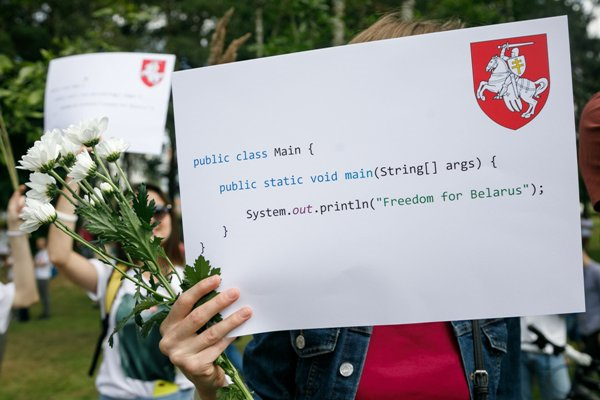

The Belarusian IT sector played a significant role in the events of 2020 which ended its "peaceful co-existence" with the country's autocratic political establishment.
Sor many years, there was a tacit unwritten contract between the Lukashenko regime and the burgeoning Belarus IT sector: "We do not touch you, and you do not meddle in politics".

Valery Tsepkalo founder and former head of the HPT tried to stand against Lukashenko in the 2020 Presidential elections but his nomination was rejected and he was forced into exile.
"Liber, a senior director of software engineering at EPAM Systems, had to leave Belarus for Ukraine for his own safety and a number of Golos volunteers ended up in detention."Together with similar initiatives, such as Babaryka's Chesniya Lyudzi (Honest People) and Zubr ("Bison"), these activists were able to expose serious discrepancies in the official results and show that Lukashenko's claimed 80% share of the vote was grossly inflated. Liber, a senior director of software engineering at EPAM Systems, had to leave Belarus for Ukraine for his own safety and a number of Golos volunteers ended up in detention.

Pavel Liber, a senior director of software engineering at EPAM Systems, led the team of volunteers behind the online platform Golos which helped to expose serious irregularities in the 2020 Presidential election.
"They were protesting, not for a crust of bread, but in the name of civil rights and European values and in opposition to the authoritarian state which had deprived them of a genuine right to vote."In response, the regime started shutting off the Internet every day at around 7p.m. as the street protests started in order to prevent the crowds from co-ordinating via social media.
As the authorities resorted to brute force measures to crush the protests, some 300 CEOs of IT companies based in Belarus threatened to move their business out of the country if the government did not put a stop to the violent repression and allow for a new election to be held.
The list included CEOs who had been previously been reliably loyal to the regime, such as Arkady Dobkin, the CEO of EPAM Systems, and Viktor Prokopenya, the founder of software development company Viaden Media.
Meanwhile, many IT specialists volunteered for the various solidarity funds set up to help the victims of state violence. A number of solidarity actions were initiated by individuals based at the HTP.
For example, Mikita Mikado, the co-founder of PandaDoc, set up an initiative called ProtectBelarus offering financial aid and re-training in the tech industry for police officers who had decided to disobey orders to beat and torture protesters. In retaliation, the company offices of PandaDoc in Minsk were raided by the police and a number of senior employees were arrested.
"However, the unrestrained brutality of the post-election crackdown meant that the efforts to oust Lukashenko were ultimately doomed to failure. The opposition was crushed and its leaders either ended up in jail or in exile abroad."Over at EPAM Systems, the senior vice-president, Makism Bogretsov, went on leave from the company to join the National Coordination Council, an opposition structure created by Svetlana Tikhanovskaya and her supporters to coordinate a peaceful transfer of power.
For a brief moment, some foreign observers speculated that Lukashenko could be facing a "CeauÃ
Ÿescu moment", and that he might end up being deposed like the former Romanian tyrant who was toppled amid intense civil unrest back in 1989.
However, the unrestrained brutality of the post-election crackdown meant that the efforts to oust Lukashenko were ultimately doomed to failure. The opposition was crushed and its leaders either ended up in jail or in exile abroad.
In the next part, we will see how the post-election crackdown impacted on the IT sector and led to a massive "brain drain" to other countries in the region. ⬆